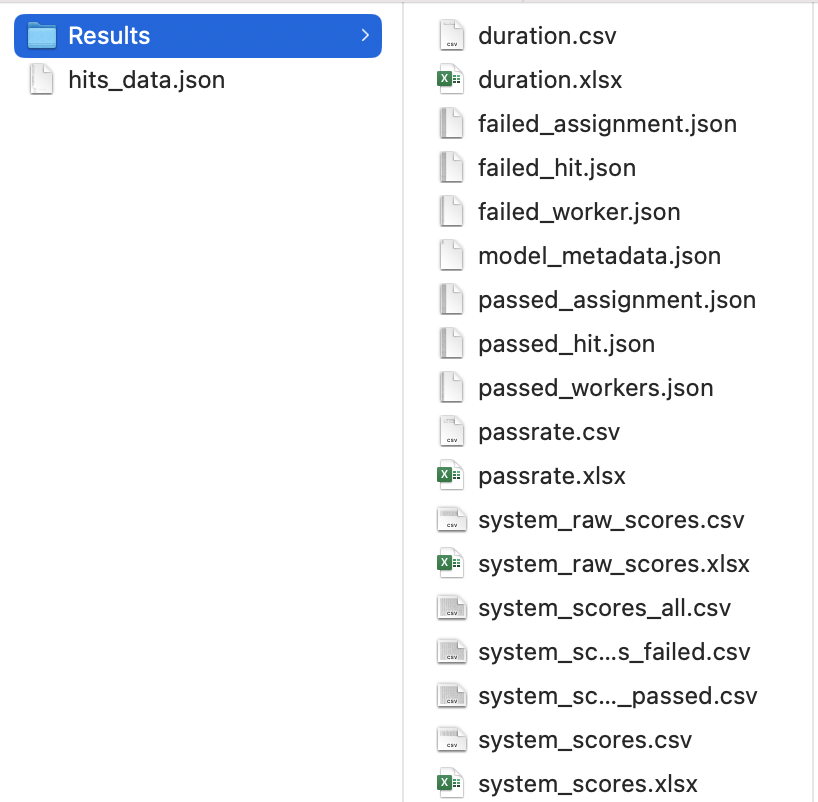Files of code and data for our [paper] in ACL 2022.
- 2022/11/18
- upload code for self replication experiment
- upload code for running our code as a tool with a simple GUI
- 2022/11/16
- upload code for processing JSON file
- update the description of JSON file structure for our code
- 2022/06/06
- upload collected dialogue files
- Pandas
- Numpy
- SciPy
- PySimpleGUI (for GUI)
-
File
mturk_process.pyis the code for processing a normative JSON file. It puts all generated files under the generatedResultsdirectory in the same directory of that JSON file. Run it by:- To run this code, please check the examples in
01-process-all-json.sh. -
Results/system_scores.xlsxis the final$z$ score of system scores. -
Results/passrate.xlsxreports the passrates in the experiment -
Results/duration.xlsxreports the average duration per HIT. - All files generated in this step are presented as follows:

- To run this code, please check the examples in
-
File
mturk_statistics.pyis the code for statistics such as rater agreement and significance tests. It generatesstatistic/directory underResults/from previous step. -
File
mturk_self_replication.pyis the code for self replication experiment. It accepted twoResultsdirectories of first and second experiment runs. It generatescorr-r1r2/directory underResults/of first run.
File human_eval_gui.py provides a tool with basic user interface to run our code.
- Directory
data/contains two directories:normative_json/andraw_mturk_csv/
-
normative_json/stores the JSON files (hits_data.json) that our code can process. Please convert your files tojson filesin the following structure if you would like to use our evaluation method in your own experiment.-
metadata: stores the metadata for scores and models-
score - stores scorename attributes pairs
-
scorename - the name of ratings, such as robotic and interesting in our experiment, with following attributes
-
positive: bool -
falsemeans this score needs reversion before computing -
qc: bool -
truemeans the current score will be used for quality control -
max: number - It is used for reversing scores with attribute
positive=falsebymax-original_score.100in our experiment.
-
positive: bool -
-
scorename - the name of ratings, such as robotic and interesting in our experiment, with following attributes
- model: a list of your models to be evaluated (except the quality-control model) - In our experiment, it is [biencoder, biencoder_p, kvmemnn, kvmemnn_p, lan_model, lan_model_p, polyencoder, polyencoder_p, seq2seq, seq2seq_p].
- qc-model: name of the qc (quality control) model - In our paper it is called "qc".
-
ranking:
nullor a list of ranked models - If null, our code will sort models by their overall$z$ scores. Otherwise, models follow the given ranking. In our experiment, the first run isnull, while second run and ice-breaker use the ranking from the first run. -
sorted_scores:
nullor a list of sorted scorenames (except$z$ and$raw$ scores) - If specified, our code will present scores in the order of given orders. In our paper, the order is [interesting, fun, consistent, fluent, topic, robotic, repetitive].
-
score - stores scorename attributes pairs
-
data: a list of result per HIT - Each element has the following structure
-
result: a list of collected data from the HIT - each element means the result of a model. In our experiment, it contains six elements: 5 competing models and a quality control model.
- model: name of current model
- score: scorenames with numerical values - For example, {robotic: 100, interesting: 37, ...}
- persona: optional - List of personas.
- dialogue: optional - Textual conversations between workers and models. Unnecessary for computing human evaluation scores.
- topic-related: optional - Unnecessary for computing human evaluation scores. Useful for conducting meta evaluation of topics.
- hit - HIT ID
- assignment - Assignment ID
- worker - Worker ID
- duration in seconds - elapsed time of a HIT in seconds
- feedback: optional - Feedback from the worker.
-
result: a list of collected data from the HIT - each element means the result of a model. In our experiment, it contains six elements: 5 competing models and a quality control model.
-
-
raw_mturk_csv/stores the original csv files we collected from MTurk. We simply provide it as a backup.
- Directory
dialogue_data/stores the detailed conversations. - Directory
md_archives/simply stores images which are used in thisREADME.md.
The following is the Bibtex formatted citation if you are interested in citing our work:
@inproceedings{ji-etal-2022-achieving,
title = "Achieving Reliable Human Assessment of Open-Domain Dialogue Systems",
author = "Ji, Tianbo and
Graham, Yvette and
Jones, Gareth and
Lyu, Chenyang and
Liu, Qun",
booktitle = "Proceedings of the 60th Annual Meeting of the Association for Computational Linguistics (Volume 1: Long Papers)",
month = may,
year = "2022",
address = "Dublin, Ireland",
publisher = "Association for Computational Linguistics",
url = "https://aclanthology.org/2022.acl-long.445",
doi = "10.18653/v1/2022.acl-long.445",
pages = "6416--6437",
}
- If you encounter any problems, please do not hesitate to contact me jitianbo@gmail.com
- Let me know if you are interested in the processing codes for topic-related content, such as the wordcloud of topics. I plan to upload them later.





